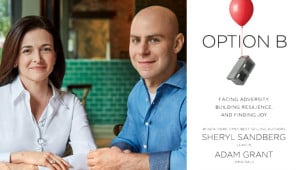Everyone wants to be strong.
No one wants to suffer to become stronger.
But life is a cycle of suffering, enduring and rebounding.
‘Either you have experienced adversity, or you are about to.”
Daniel Gilbert, the author of “Stumbling on Happiness” & Professor of Psychology at Harvard, told a packed auditorium at Boston’s Back Bay Events Center last week.
“So true…” I was nodding to myself, thinking back on my own experience while looking forward to Gilbert moderating the evening’s conversation with Sheryl Sandberg and Adam Grant, about their new book “Option B”
You may remember that the COO of Facebook suffered an unimaginable loss two years ago when her husband died during a workout at a gym. They were on a family vacation in Mexico. That sent shockwaves among many of us who had come to know Sandberg as a brave face and vocal champion for women empowerment in the workplace, as well as for men to co-share more responsibilities at home. I’ve read her book “Lean in” and become a supporter ever since.
“When I lost Dave it felt like I was sucked into a void, like I couldn’t quite breathe or think,” Sandberg told us.
Her rabbi, however, told her to “lean into the suck, to feel the suffering and not to fight it.” She did. But she also had two children, ages 7 and 10, depending on her for guidance.
“What do I do for my kids? How do I help them?” She recalled her angst.
Watching Sandberg opening up her private world of grief and listening to her battle with processing pain while extending care was both liberating and empowering.
Long before her young children lost their father, I lost my mother.
My whole world in New York suddenly collapsed. It didn’t matter that my TV news career was just taking off. It didn’t matter that I had been emotionally estranged from my mother because I had left home to be on my own since I was very young. It mattered that my mother, still in her prime, died suddenly. I could never say “Ma”, or “Mommy” to her ever again. I became a motherless daughter. I hardly knew her when she was gone. I was too busy trying to know myself.
Unlike Sandberg, I had no children depending on me. I only had my job and a rocky two-year relationship with someone who was emotionally unavailable and unable to offer comfort. I hardened my heart to go to work every day and broke down every night crying out of control.
Like Sandberg, I did not fight the pain. But unlike Sandberg, I did not reach out. After a month of mourning in Hong Kong, my hometown, I returned to New York for my job and kept up the nightly crying. The weeping and wailing went on for weeks. I cried so much I pinched a nerve in my neck and had to wear a neck-brace while chasing down news stories every day.
Being thousands of miles away from my family since I was a teenager, (first for higher education and later for my career), had helped me develop a strong sense of self, a hard shell, and a hard core. I had cultivated an inner dialogue with myself through reading, reflection and praying. I found solace and clarity in that kind of quiet contemplative practice.
While “Option B” stresses the importance of building resilience through reaching out and giving practical how-to tips, I must disagree with the notion that our resilience is measured by “the speed and strength” of our response in the face of adversity.
Why measure our resilience as if it were a problem to be solved as quickly as possible? Why see adversity as if it were an enemy that we must defeat with all our strength?
Why not define resilience by our resolve to sit with pain, and to remove its sting over us through endurance?
‘Either you have experienced adversity, or you are about to.”
We all face different circumstances when we lose a loved one.
For me, it was in solitude that I found fortitude. It took time, not speed. There was no shortcut for the contemplation of meaning, but time.
Time has finally softened my core and my shell. After more than twenty years since I lost mom, I’ve become a much more sympathetic and compassionate person towards others who experience sudden loss. I never thought about “Option B” – a concept propagated in the book, that suggests we could pick someone around and available to step up to fill the void. I couldn’t and didn’t want to seek another mom. But through my endurance of and contemplation over pain, many women friends became like a mother to me. And I have also become my own “Option B” to other younger women. Time has transmuted grief into strength. It takes time.




